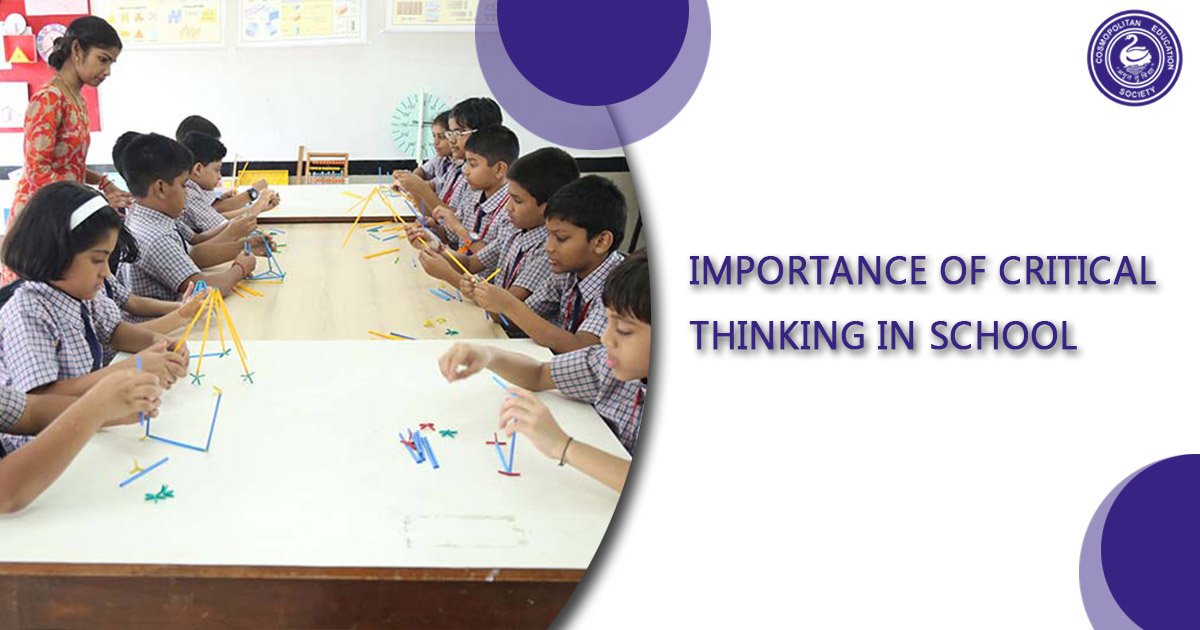
Importance of Critical Thinking in School
What Is Critical Thinking?
Critical thinking is the “art of analyzing and evaluating thinking with a view to improving it.”
With advancements in science and the permission to question everything available has given birth to a new thought process altogether called “Critical Thinking”. Critical thinkers all around the world take measured steps when considering any vital issue. They ask questions and do their robust research by gather relevant information, then form assumptions and finally test their conclusions.
1. Teachers and Critical Thinking:
Teachers have the responsibility of evaluating their students and the class as a whole, and then decide how best to assist everyone involved while meeting the due requirements of the curriculum. Materials provided by the district are tools to meet these requirements, but it takes critically thinking teachers to consider all possibilities to ensure student success. A teacher is a role model and if they do not possess critical thinking traits their students won’t inculcate those traits. As a mentor, a teacher must understand the criticality of demonstrating a critical thinking attitude.
a. Critical thinkers evaluate what they have: When you as a teacher get involves with new or new-to-you teaching materials, it is important to do an in-depth review of them. Compare overall content and resources with learning standards and objectives.
b. Critical thinkers conclude what they will need, and what they will not: For example: If the materials provided by the respective board of education have no advanced topics in your grade, think critically before you delete them from the schedule. Perhaps the students will need background knowledge of that concept you will introduce with advanced topics in the next grade.
c. Critical thinkers decide how and when to assess student progress: The purpose of student assessment is not only to assign grades. It is important to regularly check student progress. First, review the available quizzes, tests and assessments well in advance of lesson planning. As you see how students progress, ask yourself what is challenging and what they don’t pick up on topics easily. Here, you may have to re-teach and re-assess.
2. Critical thinking and benefits to students:
Critical Thinking attitude if blended with the pre-prescribed school’s curriculum will not only ensure students with self-disciplined, self-monitored and self-corrective but also will ensure students adhere to a high standard of excellence with open-mindedness.
a. It Encourages Curiosity: Students are encouraged to ask questions such as:
- What’s happening? What am I seeing?
- Why is it important? Who is affected by this?
- What am I missing? What’s hidden and why is it important?
- Where did this come from? How do I know for sure?
- Who is saying this? Why should I listen to this person? What can they teach me?
- What else should I consider?
- What if …?
- Why not?
These questions encourage substantial growth within students benefiting school life as well as for the future.
b. It Enhances Creativity: There’s no doubt that effective critical thinkers are also largely creative thinkers. Creativity has unquestionably defined itself as a requisite skill for future career opportunities. Hence, it is critical to start fostering an environment that aids critical thinking from the school itself.
c. It Improves Problem-Solving Ability:
Those who think critically tend to be great problem-solvers. This is probably the most important skill we can help your students in the class to master. The children of today are the leaders of tomorrow and will face complex challenges using critical thinking capacity to engineer imaginative solutions. Our students are inheriting issues like global warming, overpopulation, pollution, the need for developed health care, water shortages, effective waste management, energy crises, etc.
Summing up:
It is very significant to understand that Critical Thinking is a Skill for Life, Not Just Learning. We at Shri. Harshad C. Valia International School make sure to have a conducive environment to champion critical thinking. Our teachers are introduced to our robust curriculum well in advance with the inter-relatedness of each topic. Our aim as a school is not only curriculum completion and examinations but also to churn out versatile and future successful leaders of tomorrow.
